
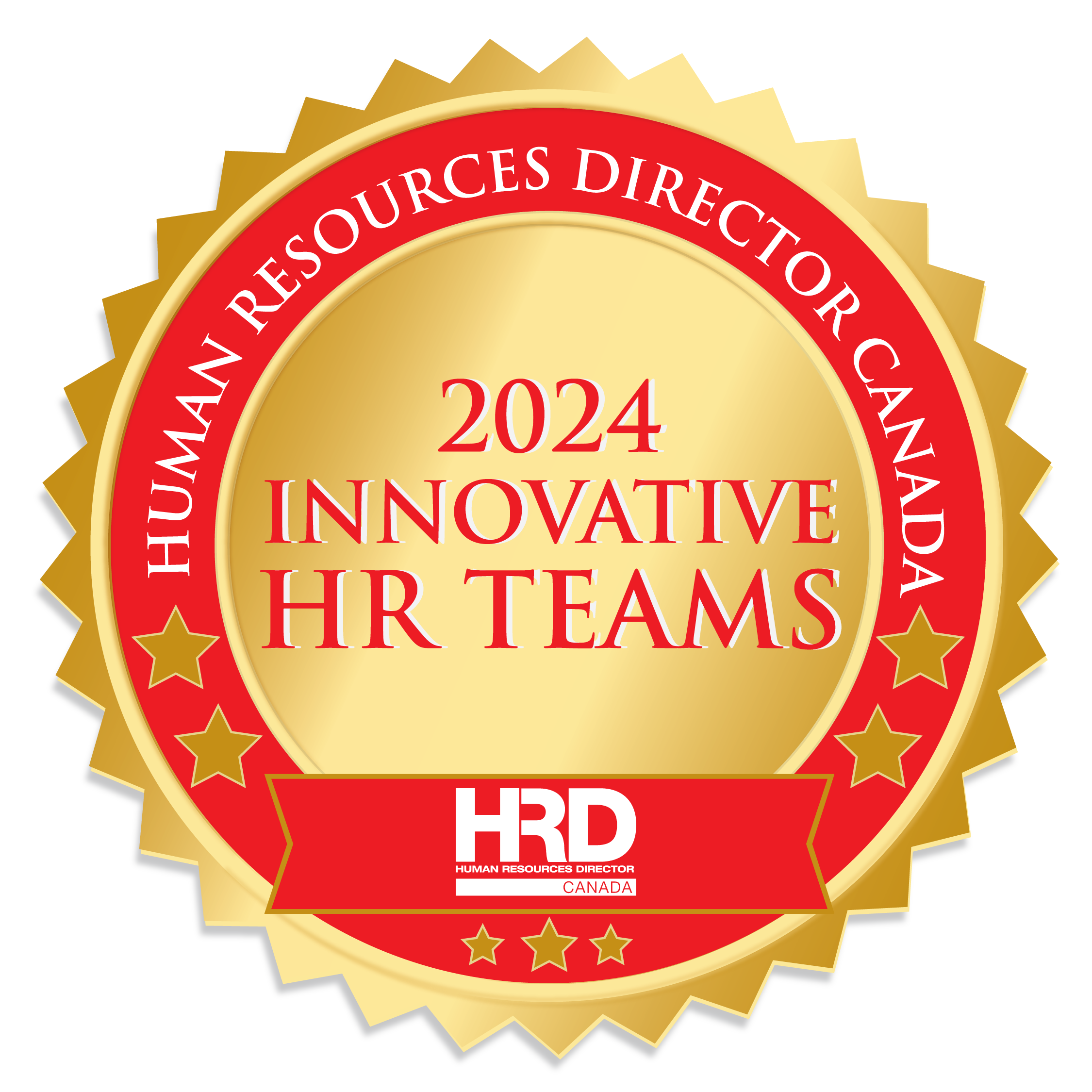
Jump to winners | Jump to methodology
Human Resources Director Canada recognizes the Innovative HR Teams of 2024, a collective of high-performing HR innovators who drive progress and achieve remarkable results for their people and organizations.
Three of the winners highlight the proficiencies that define a cutting-edge HR team:
Rise Air: The HR team at the Indigenous-owned company proactively implements new programs in talent attraction, retention, and training. They conduct in-depth research and community consultation, evaluating and tweaking programs where needed. At the heart of its innovative approach is a commitment to involving its people in developing strategies to tackle challenges.
Agnico Eagle Mines: With a growth mindset, the HR team challenges the status quo as it moves the needle forward on developing the future workforce. This creative and collaborative team works closely with its business leaders to understand current and future challenges to ensure aligned strategies. Creating new programs on a pilot-project basis has seen it remain at the forefront of innovation.
Town of Innisfil: Their innovative approach to learning and development is anything but traditional, especially in local government. The HR team prides itself on being a municipal leader and thinking outside of the box. The team is agile, adapting to new norms and shifting their approach to transform programs innovatively.
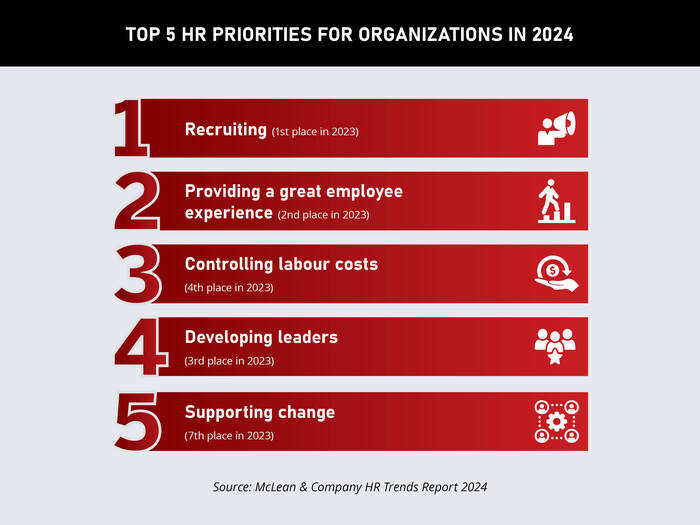
“A leading innovative HR team has a future-ready mindset, preparing their team and the organization to change quickly and capitalize on new opportunities presented by changes in the external environment,” explains James Kim, who manages HR Research & Advisory Services at McLean & Company.
He emphasizes that HR innovators who invest in the following capabilities characterize a forward-looking team:
technical skills such as digital and analytical proficiency
business acumen
risk management
critical thinking
creativity
“These skills enable HR to ask the right questions for the future and remain open and flexible to disruption, whether caused by rapid advancements in technology, a volatile labour market, or anything in between,” Kim adds.


For the airline’s HR team, supporting the lifeblood of Saskatchewan’s First Nations communities is crucial to its innovation.
“If you put people first and build relationships with trust and respect, you can have an organization that everyone can be proud of,” says Tracy Young-McLean, vice president for human resources and corporate services. “We've worked aggressively on our Indigenization policy because we realized there was a lack of consultation with community members, and that consultation feeds into everything we do operationally.”
Under the umbrella of culture change, the organization has implemented several inventive initiatives, including:
establishing an Indigenous advisory committee to its board, whose members have input on all critical decisions
developing a made-in-Saskatchewan program to train northern community members to become pilots who will stay in the province
increasing Indigenous employment by actively working to integrate the use of the Dene and Cree languages and cultures into the company’s fabric
providing Indigenous awareness training for all employees
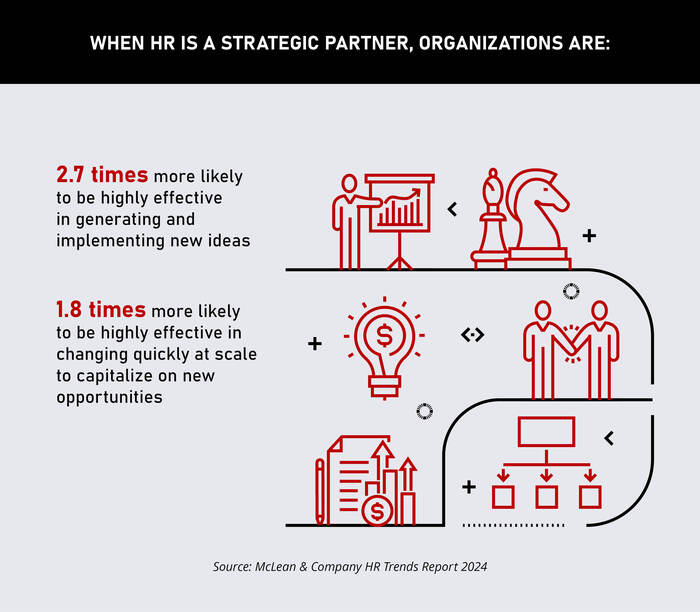
The Rise Air team expects the pilot training program to significantly impact the communities it serves, particularly by elevating employees from ground crew and airport counter support to pilot roles.
“We’re at the beginning of this journey, but a major part of the innovation was identifying those needs,” notes Young-McLean. “The HR team hasn’t been afraid to bring change; they’ve done the research, evaluation, and brought in programs that have positively impacted our employees and customers.”
The HR team maintains its award-winning position at the leading edge of innovation by continuously re-evaluating its practices and fostering an innovative culture that boldly addresses challenges.


Based in Northern Ontario, the regional mining company’s innovative HR team has set a gold standard in developing the future workforce. Its innovative training program supports the creation of talent pipelines, addressing urgent labour market needs through a collaborative and responsive approach.
“The space around future workforce development and the HR function is in the spotlight across all industries, not just in mining,” explains Nathan Cloet, HR director for the Ontario region. “It’s imperative that we address the current and future workforce supply needs and continue to provide value and deliver tangible results to the business.”
Highlights of the company’s training program include:
multidimensional learning components, including field placements, which mitigated the region’s labour market needs with positive employment outcomes for disproportionately impacted and traditionally underrepresented groups
participation of 223 individuals in the program’s first year; of those, 92 people were Indigenous, 101 were women, 80 were youth aged 29 and under, and 14 were persons with disabilities
delivery of core training opportunities to next-generation talent, including trade apprenticeships, underground miner training, and mineral process operator training, along with wraparound support such as mentorship and financial assistance
“We have already hired multiple participants from this initiative who are skilled, resilient, and job-ready,” notes Cloet.
By utilizing its existing ecosystem, which includes world-class capabilities, people, and equipment, the HR team is poised to scale the program to maximize entry-level talent pipelines.
“The one innovative approach we’d like to see around workforce supply is breaking down silos within industries and governments and collaborating rather than competing for the same talent,” Cloet reflects. “I think we’ll have a much more powerful impact to resolve this challenge.”


Great isn’t good enough for the multi-award-winning HR team at the Simcoe County municipality in Ontario, states people and talent manager Lauren Small.
“We recruit the most intelligent, innovative, collaborative, and talented people to join our team,” she explains. “Whether recruiting across our partner organizations, refining our core programs, encouraging leadership at all levels, developing our staff or simply looking for ways to be more effective and efficient, we bring a data-driven approach that is reinventing the human resources field.”
The Town of Innisfil’s HR innovators differentiate themselves in their approach to learning and development, as evidenced by the following:
a $450,000 Ontario government grant that fully funded a partnership with Schulich Executive Education Centre to provide a training program to town staff, partner organizations, and key community partners
a unique and innovative professional development program on a minimal corporate training budget that has attracted over a dozen external participants and is now generating revenue
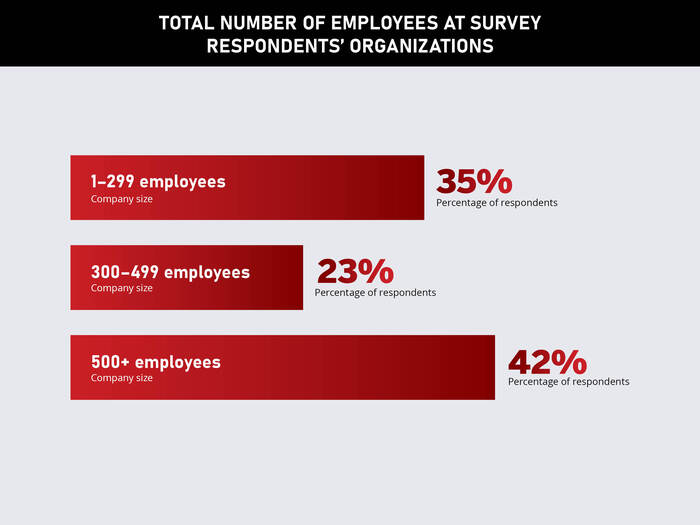
“By investing and leveraging new technologies, many facets of learning and development have been radically changed to meet the demands of our modern, progressive organization committed to a culture of learning,” notes Small. “We pride ourselves on providing new training methods, measuring learning effectiveness, and making the administration of training programs more efficient.”
With a reputation for passionately helping its employees unlock their full potential, the HR team has identified attracting and retaining talent as a significant priority now and in the future, as well as issues impacting the next-generation workforce, including:
an impending skill shortage
an increasingly cross-generational and diverse workforce
need for targeted learning
a significant gap in leadership competencies
“We will need to continue to support a strong culture that differentiates Innisfil so we can attract critical talent and retain employees,” Small adds. “My small but mighty team will continue to ensure we have strong talent management fundamentals that establish a playbook and set priorities to meet these challenges.”
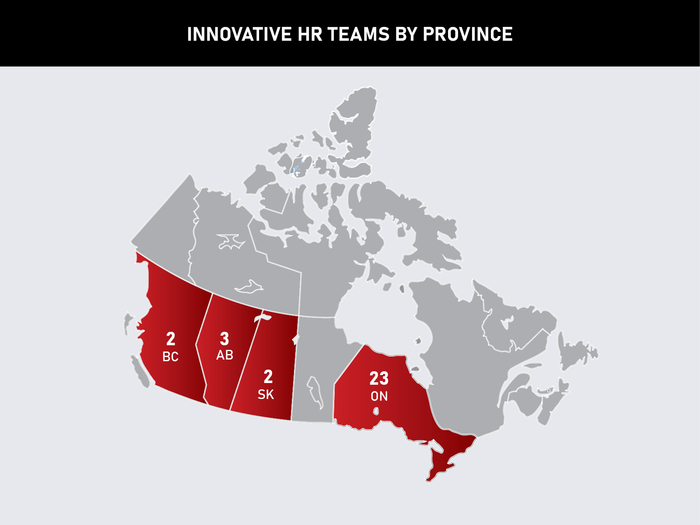

HRD Canada’s Innovative HR Teams 2024 report recognizes firms that are breaking boundaries to move the HR industry forward — whether it’s by taking a progressive approach to recruitment, introducing new technology or rolling out a groundbreaking reward and recognition strategy. The report offers HR teams a unique benchmarking opportunity to see how their initiatives compare to those of the profession at large.
Readers were invited to submit entries showcasing HR teams that have agile, bold, and forward-thinking people strategies. Nominations focused on areas including talent management, diversity and inclusion, health and wellness, and HR technology. Initiatives introduced and results achieved in 2023 were highlighted.
HRD Canada objectively assessed each entry for detailed information, true innovation and proven success — along with benchmarking against the other entries — to determine the winners.